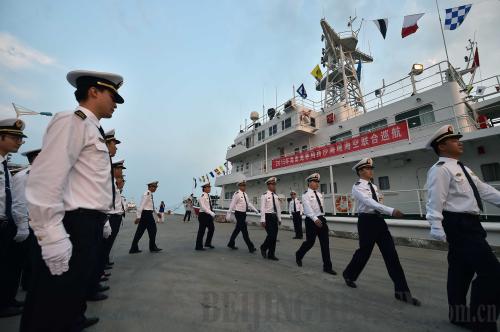
Sun Jianguo (front right), Deputy Chief of the General Staff of the People's Liberation Army, arrives for a meeting ahead of the 14th Asia Security Summit, or the Shangri-La Dialogue, in Singapore on May 29 (CFP)
Calculated move
Yao doubted the real purpose of U.S. criticisms of China. She stressed that maritime disputes should be settled by the actual countries involved through dialogue based on international law. The United States—a claimant in none of these disputes—could help to bring about this dialogue, but it is not in a position to attack or discredit any country involved.
Ironically, though the United States has postured itself as serving to "uphold justice," the country itself has actually refused to ratify the UN Convention on the Law of the Sea (UNCLOS). Nevertheless, it is the "boss" of its Asia-Pacific military alliance.
Some observers noted that the U.S. interference in the South China Sea disputes aims neither to uphold justice nor to safeguard international law, but to enhance its regional dominance and influence.
Zhou Shixin, a research fellow with Shanghai Institutes for International Studies, believes that the United States is gesturing to back its regional allies up and inciting them to confront China, which would further solidify its leading position of the alliance.
Unbounded by the UNCLOS, Washington tries to use its influence and even military might—sending navy aircraft for close-up reconnaissance—to interfere in the disputes, which may cause volatile incidents, said Zhou.
Some observers from other ASEAN countries expressed similar concern. In an interview with Xinhua News Agency, Huang Jing, Director of the Center on Asia and Globalization at the National University of Singapore, said any attempt to introduce outside forces in the South China Sea disputes will only complicate it. The problem should be settled through negotiations between concerned parties.
Huang claimed that the United States' Pivot to Asia strategy announced in 2010 contributed to the hyping of the South China Sea disputes.
According to Huang, before 2010, media coverage on the South China Sea issue consisted of no more than 30 articles. However, after the U.S.' high-profile Pivot to Asia, reports about the issue went up to over 3,000.
Yao echoed Huang's sentiments, suggesting that the previously calm South China Sea has lost its tranquility since Washington embarked on its Pivot to Asia strategy.
Fundamentally, observers claimed that the current U.S.-dominated security architecture in the Asia-Pacific region attributed tension in the South China Sea.
Established during the Cold War, Asia's security architecture has been hijacked by the U.S.-dominated mode of forging military alliances with countries in the region, such as the U.S.-Japan alliance and U.S.-Philippines alliance.
Huang said that these alliances were set up to confront rather than cooperate, but the world has changed significantly; hence, a different, more cooperative approach should be adopted.
Observers suggested that seeking common security in the region should be advocated for the sake of regional peace.

















































